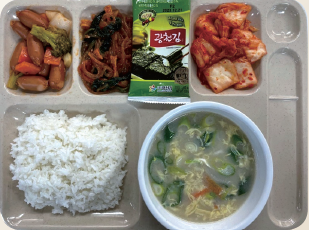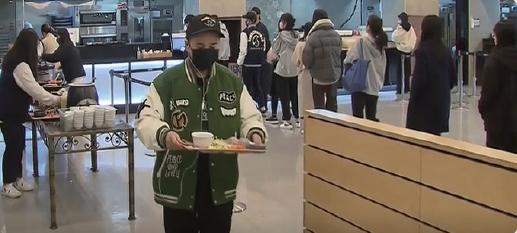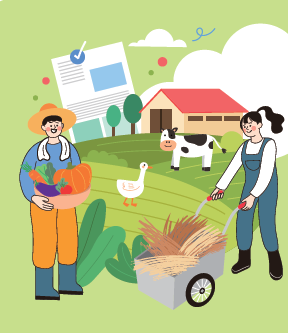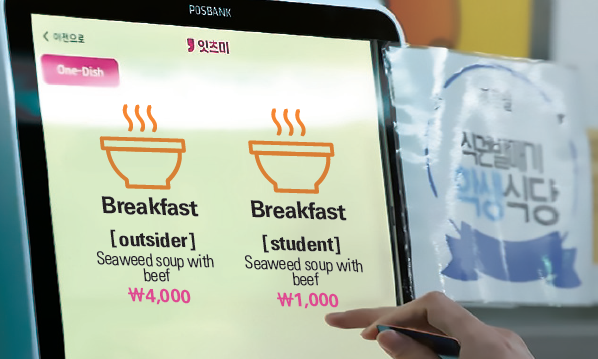Many universities, including Sungkyunkwan University (SKKU), are taking part in the ₩1,000 Breakfast Program. It means that college students can start their mornings with a warm meal that does not break the bank. The program is up for discussion as an alternative to reduce the increased burden of inflation. Thus, the Sungkyun Times (SKT) will explore the current state and structure of the Breakfast Project and possible methods to maintain it.
\1,000 Changes the Morning
-What Is the ₩1,000 Breakfast Project?

The ₩1,000 Breakfast Project began in 2017 by 10 universities to promote healthy eating habits and rice consumption. It is operated through a system where college students and the Ministry of Agriculture, Food and Rural Affairs (MAFRA) each pay \1,000, and schools cover the rest at their discretion. Until this April, 41 campuses across the country joined the program, including SKKU, Seoul National University, and Kyung Hee University (KHU). Afterwards, more universities joined the business as MAFRA announced to double the funds for the breakfast project. Above all, the project has recently been thrown into the spotlight amid the age of soaring inflation. According to a survey conducted by the Student Union Network of National Universities last March, 95% of the respondents said they were sensing the up-surge in prices and chose food expenses as the most burdensome issue. In such a situation, the ₩1,000 Breakfast Project could address the concerns faced by the young.
-A Cost-effective Breakfast for Kingos
SKKU has maintained the ₩1,000 Breakfast Project since 2017. Initially, the project was funded solely through donations from the alumni. Now, additional government subsidies and contributions are supporting 20% of the program fund. In both campus cafeterias of SKKU, such as Eunhaenggol, and Haengdangol, Kingos can enjoy a warm, filling breakfast with rice, soup, and various side dishes for only ₩1,000 between 8 a.m. and 9 a.m. Lee Jin-ho (Sophomore, College of Sport Science) told the SKT, “Compared to last year, the breakfast’s homemade style menus are the best, cost-effective option, so I have them four times a week.” Besides, SKKU also provides various menus such as noodles, sandwiches, and beverages, which earned positive feedback from students. In fact, with various take-out menus and huge promotions through media such as social media and alumni magazines, SKKU’s breakfast business won the grand prize in the 2022 Meal Project Award. Thereby, SKKU’s Breakfast Program is likely to be a great model for other schools that are new to the program.

An Imperfect ₩1,000
-Insufficient Support Subsidies
Various support funds are necessary to operate a ₩1,000 meal project effectively. As most budgets for the project are allocated from the schools, universities with financial problems may be burdened to take part in the project. Also, as the number of students decreases, schools have no choice but to operate dining halls on a more restricted budget. Hence, national and public provincial universities with relatively solid finances were the most involved. Among 23 universities in the Gyeongsangnam Province, Gyeongsang National University was the only one that participated in the program. Last March, in an interview with Yonhap News, a staff member of a university in Gyeongnam said, “As the number of students reduces every year, our school inevitably has had to cut the budget. We could not start the program although we wanted to.” Thereby, tight financial situations seem to result in changes in the menus, which ultimately increases the frequency of students receiving low-nutritional meals. Kim Yeong-gyu, the chief of Chonnam National University food service management, said in an interview with Sisa Journal, “If the fund shortage worsened, the composition of meals would first become less nutritious.” In short, providing meals deficient in nutrients due to such fiscal troubles goes against the initial intention of the program, which is to encourage college students to form a healthy lifestyle.
-The Opening System
As the project expanded in earnest this year, its system has not been established properly. Although it only targets students, external visitors have also benefitted from the project, which has caused several complications. On April 25th, a middle-aged visitor purchased breakfast at the SKKU Natural Sciences Campus student cafeteria and paid ₩4,500, the normal price. He explained to the SKT that he was satisfied with the meal and would come back again. In this case, the man was easily distinguishable from other students due to his cycling outfit. However, if visitors arrived in more similar clothing to students, they could also have breakfast for ₩1,000, as there is no system to distinguish between them yet. Roh Hyeonjong, a manager of SKKU’s breakfast project, also told the SKT, “Our school recognizes the fact that there are several non-students that have the breakfast for \1,000.” If such a utilization rate of non-students increases, it can cause incorrect demand forecasts and misuse of donations. Furthermore, it could lead to fewer benefits for students, even if the donation funds are managed thoroughly. Also, donations, the main financial resource, are uncertain in terms of the amount and regularity of their funds. Therefore, the system needs to be improved in a number of ways.

To Spread the Happiness of ₩1,000
-Subsidies Management and Collaboration with Communities
First, the government must methodically expand the financial aid for the project. In April, the MAFRA expanded the scale of the business depending on the number of students and the budget. However, appropriate fund distribution and periodic management must be followed when magnifying the business to prevent poor operations. Continuous monitoring is especially necessary on whether the subsidies are paid properly and are not used to supplement other revenues. Also, by cooperating with the local communities, universities can lower costs and provide nutritious breakfast meals. For instance, Chungcheongnam Province has run its own \1,000 breakfast business since last May. Through its project, ₩3,000 can be funded for each breakfast meal of universities. The province remarked that the program would ease the burden of students’ food expenses and boost agricultural product consumption. Thereby, more regions must cooperate with local communities to create a positive synergy on the ₩1,000 meal project and even the surrounding local communities.
-System for a More Sustainable Operation
It is possible to identify whether the beneficiaries of the breakfasts are actually the students, by considering the operation method of each school. In the case of KHU, which restricts the number of supplied meals to 130 each day, the school cafeteria organizes the menus of students and visitors separately through kiosks. Students can purchase breakfast at ₩1,000 after verifying themselves with a student card, while the rest pay the original price. Korea University also distinguishes students from visitors through a system that allows them to scan student cards at kiosks. Moreover, organizing student monitoring groups would be beneficial for the project’s sustainability. For instance, the Yonsei International Campus Representative Committee established a campus meal monitoring group. Members of the association document the meal’s composition, taste, and even services and regularly report them to the respective managers. On top of that, monitoring groups must expand their job to inform of campus schedules, including exams and diverse festivals, to encourage suppliers to predict the students’ demand in advance. For instance, during the midterm season, food supply companies of SKKU prepared additional meals and gained positive feedback from students who were preparing for exams. Accordingly, expecting the demand of students through monitoring groups will be an effective way to use donations.

The recent rise in prices has weighed a substantial burden on undergraduates. In this situation, Kingos cannot help but welcome the ₩1,000 Breakfast Project and expansion of its support. If the systematic government fund and demand prediction system are overhauled, it will only be a matter of time before the new breakfast culture emerges in campus life.
